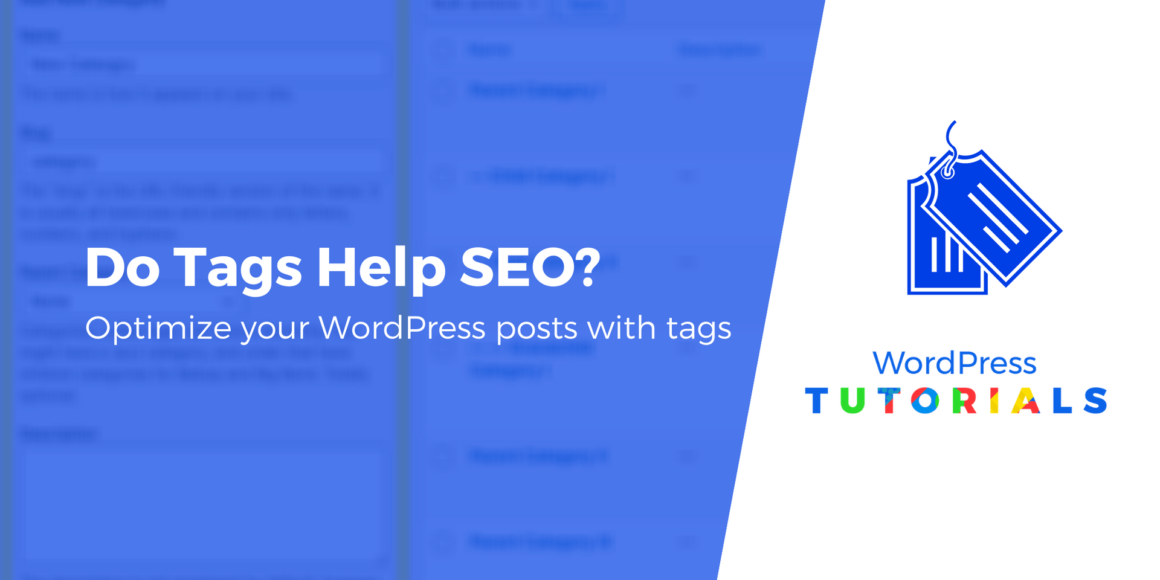Do WordPress tags help SEO? Well, they might, even if not directly, and that’s the topic of this post.
Categories and tags are fundamental features of WordPress. However, understanding the best way to implement them to organize and optimize your posts is a bit more involved than you might think.
Categories and tags may not be highly critical for search engine optimization (SEO). For instance, your visitors are unlikely to find your posts in search engine results because of your tags (though it’s possible). However, they do help you organize your site so that users – and search engine crawlers – can easily navigate it.
In this article, we’ll discuss the difference between WordPress categories and tags and whether they help SEO. Let’s jump in!
Understanding WordPress categories vs tags
Categories and tags are descriptors or labels for your content. They may appear below or above your post’s content (depending on your theme). In the Block Editor, you can add them in the Document tab of the right sidebar:
Both categories and tags can help you group similar content, but there are some differences you should consider.
Categories are like chapters in a book. If there is a recurring topic that you often write about, it might make sense to create a category for it:

For instance, if you’re running a culinary blog, you might have one called ‘Recipes’.
You can also assign several categories to the same post if the topics overlap. For example, one post might fall into the ‘Recipes’ and ‘Vegetarian’ categories.
On the other hand, tags are like keywords that best describe the content of your post. They work as an index at the end of a book so that your readers can find related posts. For instance, if you’re publishing a pizza recipe, your tags might be ‘homemade,’ ‘pizza,’ ‘Margherita,’ and ‘gluten-free’.
Categories and tags are excellent ways to organize your content. They help users navigate through your website, which can improve their browsing experience. They can also help Google bots assess your website’s structure, so it’s smart to use them wisely.
Do WordPress tags help SEO?
On their own, categories and tags are not critical for SEO. However, they can affect other elements that influence your search engine rankings, such as your site’s overall user experience (UX).
For instance, contrary to popular belief, WordPress tags don’t work like hashtags on social media. Overstuffing your page with dozens of keywords won’t do you any favors.
Users are unlikely to find your page through a tag alone. Plus, cluttering your post with excessive descriptors might make it harder to navigate, ultimately lowering your rankings.
While categories are obligatory for posts (WordPress will mark posts as ‘Uncategorized’ if you don’t create your own), you don’t have to use any tags at all. Still, it’s smart to use them strategically so that your visitors can navigate your content. This might encourage them to browse related posts and stay on your website longer, which can boost SEO.
Finally, you should avoid duplicating categories and tags (such as using ‘recipes’ for both). This can make it harder for Google to rank your pages as they can compete against each other.
Conclusion
WordPress categories and tags are extremely beneficial for organizing your posts. When used wisely, they can also help your SEO efforts, even if it’s just by indirectly boosting the other metrics that Google looks at (such as time on site).
In this article, we’ve discussed whether categories and tags help boost SEO in WordPress. To recap, taxonomies are not a critical ranking factor. However, it’s still smart to follow best practices and use them to keep your website neatly organized.
For some other strategies to improve your site’s SEO, check out these guides:
Do you have any questions about categories vs. tags and SEO? Let us know in the comments section below!
Free guide
5 Essential Tips to Speed Up
Your WordPress Site
Reduce your loading time by even 50-80%
just by following simple tips.
Keep reading the article at ThemeIsle Blog. The article was originally written by John Hughes on 2020-11-13 05:20:47.
The article was hand-picked and curated for you by the Editorial Team of WP Archives.

